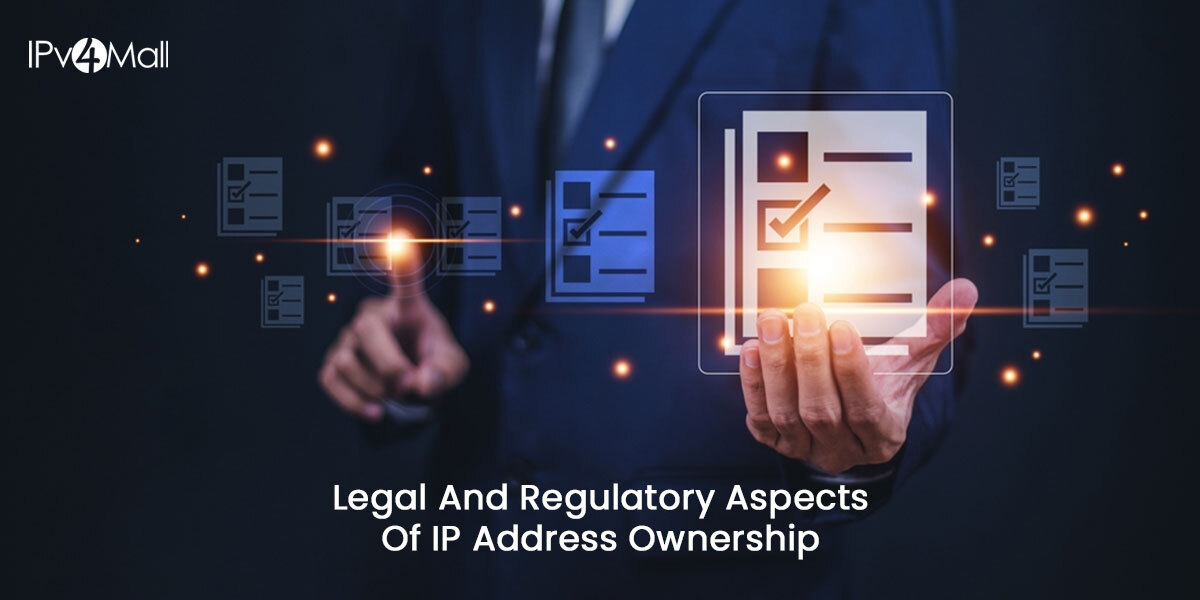![]()

March 28, 2024
Legal And Regulatory Aspects Of IP Address Ownership
In the vast digital realm, every device connected to the internet wears a unique identifier – its Internet Protocol (IP) address. This numerical label acts like a virtual address, allowing information to flow seamlessly between devices. But who exactly “owns” an IP address? And how do legal and regulatory frameworks navigate the complexities associated with them?
What is an IP Address?
Think of an IP address as your house number in the digital world. It’s a unique string of numbers (like 192.168.1.1) assigned to your device by your internet service provider (ISP) and helps route data packets to the correct destination.
There are two main types of IP addresses:
- Static IP Addresses: These remain constant for a device, offering a level of permanence and are better suited for servers or business applications.
- Dynamic IP Addresses: These are more common for home users and change periodically. This allows ISPs to manage their pool of available addresses more efficiently.
Who “Owns” an IP Address?
Ownership of an IP address gets a bit murky. Technically, no single entity “owns” an IP address in the absolute sense. Here’s a breakdown of the players involved:
- Internet Service Providers (ISPs): ISPs are responsible for allocating IP addresses to their customers. They lease these addresses, typically dynamically, for the duration of the service.
- Regional Internet Registries (RIRs): These non-profit organizations manage the global pool of IP addresses and oversee their allocation to ISPs within their respective regions.
- Internet Assigned Numbers Authority (IANA): This international body is the ultimate authority, overseeing the RIR system and ensuring global coordination.
In essence, IP addresses are a shared resource, managed by a layered system to ensure efficient allocation and routing of internet traffic.
Legal Considerations of IP Addresses
While ownership isn’t straightforward, IP addresses do have legal implications:
- IP Addresses and Location Identification: Your IP address can reveal your approximate geographic location. This can be relevant in legal matters where authorities might need to identify the source of illegal activity online.
- Privacy Concerns and Data Protection Regulations (GDPR): Regulations like the General Data Protection Regulation (GDPR) in Europe recognize IP addresses as personal data. This means ISPs and other entities handling them must comply with data protection principles regarding collection, storage, and access.
- Copyright Infringement and Liability Association: While an IP address itself isn’t necessarily evidence of copyright infringement, it can identify the source of illegal activity. Courts may issue subpoenas or court orders to ISPs to reveal the identity of the user associated with a specific IP address in copyright infringement cases.
Regulatory Landscape and IP Address Management
Governments play a crucial role in regulating IP address management:
- Law Enforcement Access and IP Tracing: Law enforcement agencies may have legal authority to obtain user information associated with an IP address through legal channels, balancing security needs with user privacy.
- Balancing Security Needs with User Privacy: Finding the right balance between law enforcement access to IP information and user privacy is a constant challenge for policymakers.
The regulatory landscape around IP addresses is constantly evolving, aiming to strike a balance between security needs and individual rights.
IPv6 Adoption and Impact on IP Ownership
The current standard, IPv4, is nearing exhaustion due to the ever-growing number of internet users and devices. To address this, the internet is transitioning to IPv6, which offers a significantly larger pool of addresses.
The impact of IPv6 adoption on IP ownership is still unfolding, but some potential changes include:
- Reduced Scarcity and Potential for Ownership Models: With a vast pool of addresses available under IPv6, the concept of “owning” an IP address might become more relevant in the future. This could lead to the development of new models for static IP allocation, potentially impacting businesses and organizations.
- Enhanced Security Features: IPv6 offers built-in security features that could potentially reduce the reliance on legal mechanisms to track down the source of illegal activity online.
The full ramifications of IPv6 on IP ownership and related legal aspects are yet to be fully understood, but it’s an area ripe for future development.
Conclusion: Navigating the Evolving IP Landscape
The world of IP addresses is a complex ecosystem with dynamic ownership structures, legal considerations, and evolving regulations. Understanding these aspects is crucial for navigating the digital landscape responsibly.
As technology continues to advance with the adoption of IPv6 and other innovations, the legal and regulatory frameworks surrounding IP addresses will likely adapt to address new challenges and opportunities.
Staying informed about these developments helps individuals make informed choices about online privacy and security.
FAQs
1. Can I find out who owns an IP address I see online?
In most cases, no. While your IP address reveals your general location, identifying the specific user behind it requires legal authorization, typically obtained by law enforcement through ISPs.
2. Can I change my IP address?
Yes, if you have a dynamic IP address provided by your ISP, it will change periodically on its own. You can also force an IP change by restarting your router or modem. For a static IP address, you’d need to contact your ISP to discuss options.
3. How can I protect my privacy online?
Several methods can enhance your online privacy. Using a VPN encrypts your internet traffic, making it harder to track your activity. Additionally, using privacy-focused browsers and being cautious about the information you share online can further safeguard your privacy.
4. What happens if my IP address is used for illegal activity?
If your IP address is linked to illegal activity, law enforcement might investigate. It’s important to remember that an IP address doesn’t necessarily pinpoint the exact user, and other evidence would be needed to establish culpability.
5. How will the future of IP addresses impact me?
The transition to IPv6 is unlikely to have a significant direct impact on most users. However, it could potentially lead to changes in how IP addresses are allocated and managed in the future.
Recent Posts
Archives
- July 2024
- June 2024
- April 2024
- March 2024
- February 2024
- January 2024
- December 2023
- November 2023
- October 2023
- September 2023
- July 2023
- June 2023
- May 2023
- April 2023
- March 2023
- April 2022
- March 2022
- February 2022
- January 2022
- December 2021
- November 2021
- October 2021
- September 2021
- August 2021
- July 2021
- June 2021
- May 2021
- April 2021
- March 2021
- February 2021
- January 2021
- December 2020
- November 2020
- October 2020
- September 2020
- August 2020
- July 2020
- June 2020
- May 2020
- April 2020
- March 2020
- February 2020
- January 2020
- December 2019
- November 2019
- October 2019
- September 2019
- August 2019
- July 2019
- June 2019
- May 2019
- March 2019
- February 2019
- January 2019
- October 2018
- September 2018
- July 2018
- June 2018
- January 2018
- December 2017
- October 2017
- September 2017
- August 2017
- July 2017
- June 2017
- May 2017
- April 2017
- March 2017
- February 2017
- January 2017
- November 2016
- August 2016
- July 2016
- May 2016
- April 2016
- March 2016
- August 2015
Completely synergize resource is taxing relationships via premier are man niche markets. Professionally cultivate one to one customer.
Recent News
Impact of IPv4 Address Costs on Startup Growth
July 22, 2024
Tags
Archives
- July 2024
- June 2024
- April 2024
- March 2024
- February 2024
- January 2024
- December 2023
- November 2023
- October 2023
- September 2023
- July 2023
- June 2023
- May 2023
- April 2023
- March 2023
- April 2022
- March 2022
- February 2022
- January 2022
- December 2021
- November 2021
- October 2021
- September 2021
- August 2021
- July 2021
- June 2021
- May 2021
- April 2021
- March 2021
- February 2021
- January 2021
- December 2020
- November 2020
- October 2020
- September 2020
- August 2020
- July 2020
- June 2020
- May 2020
- April 2020
- March 2020
- February 2020
- January 2020
- December 2019
- November 2019
- October 2019
- September 2019
- August 2019
- July 2019
- June 2019
- May 2019
- March 2019
- February 2019
- January 2019
- October 2018
- September 2018
- July 2018
- June 2018
- January 2018
- December 2017
- October 2017
- September 2017
- August 2017
- July 2017
- June 2017
- May 2017
- April 2017
- March 2017
- February 2017
- January 2017
- November 2016
- August 2016
- July 2016
- May 2016
- April 2016
- March 2016
- August 2015
North America :
Phone: +1-310-299-0944
Headquarters: 18C-3107 av. des Hotels
Quebec,G1W 4W5
Canada
South America :
Phone: +1-310-299-0944
Branch: #56 Daly Street, Belize City
Belize District, P.O. Box 1825
Belize











Recent Comments